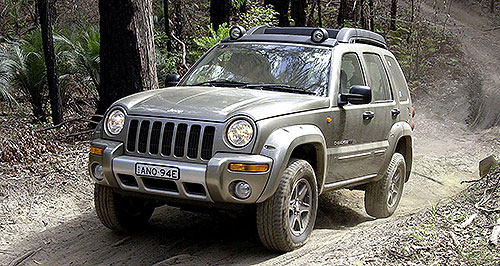News - JeepJeep backs down and issues recall on 2.7 million SUVsAbout-face: Around 28,000 Jeeps built between 1993 and 2007 will be recalled in Australia. Chrysler says it will recall 2.7 million Jeeps after all, including 28,000 in Oz20 Jun 2013 JEEP has bowed to pressure from the US road safety watchdog, announcing a worldwide recall of 2.7 million vehicles to fix a safety defect. However, it has disputed claims by the National Highway Traffic Safety Administration (NHTSA) that the recalled vehicles are as dangerous to owners as the watchdog has suggested. The company said today it would voluntarily recall Grand Cherokees produced between 1993 and 2004, and Cherokees (called Liberty in the US) built between 2002 and 2007 over a potential fuel tank fault that could, in the event of a rear collision, cause a fire. “The performance defect is that the fuel tanks installed on these vehicles are subject to failure when the vehicles are struck from the rear,” the NHTSA’s letter to Chrysler at the time of the investigation said. “Such failure can result in fuel leakage, which in the presence of external ignition sources, can result in fire.” About 28,000 vehicles sold in Australia are part of the recall, and the company is currently working with the federal government to contact owners. Considering the age of some of the affected vehicles, many may no longer be in service. Fiat Chrysler Group Australia director of corporate affairs Karla Leach told GoAuto today it was company policy to follow through on global recalls for vehicles affected here. Jeep said two weeks ago that it would ignore the NHTSA request as the investigation’s conclusions were “based on an incomplete analysis of the underlying data”. Jeep said it had been working with agency on the matter since September 2010. “The company does not agree with NHTSA’s conclusions and does not intend to recall the vehicles cited in the investigation,” it said at the time. “The subject vehicles are safe and are not defective.” It had until today, June 18, to officially concede to the NHTSA request. It eventually acquiesced and will now give the order for visual inspections to be carried out and, if necessary, upgrades given to the rear structure to better manage crash forces in low-speed impacts. The inspections will include taking a close look at both factory and aftermarket towbars. But while Jeep has reversed its stance and issued the recall, it says it is only to put customer concerns at rest, and is not an admission that its vehicles are unsafe. “Chrysler Group’s analysis of the data confirms that these vehicles are not defective and are among the safest in the peer group,” the brand said. “Nonetheless, Chrysler Group recognises that this matter has raised concerns for its customers and wants to take further steps, in coordination with NHTSA, to provide additional measures to supplement the safety of its vehicles.” It is rare, but not unprecedented for car-makers to refuse NHTSA directives. Chrysler successfully fought a recall of the US-market Dodge Stratus and Chrysler Cirrus in 1996. This recall is not the only such campaign Chrysler Jeep has announced this week. Yesterday, it put out a recall notice for 6794 Patriot and Compass compact SUVs in Australia over a potentially faulty control module that could fail to deploy the seatbelt pre-tensioner and/or the side curtain airbags during a low-speed rollover. The company’s Australian arm also recalled 5500 Grand Cherokees and Commanders in May, and 7000 Grand Cherokees and Cherokees in January (see separate stories linked below for more information on these recalls).  Read more |
Click to shareJeep articlesResearch Jeep Motor industry news |
















Facebook Twitter Instagram